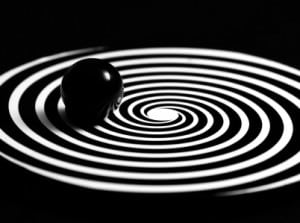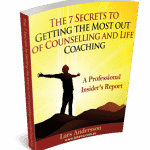Living in the present
 We often talk about the importance of living in the present, but really, what do we mean by that? Do we mean that literally? Then, how long is that present? From a physics/mathematics perspective the present moment has no duration. It can’t have, since any duration, no matter how small could always be split into past and future. Hence, the actual present moment by definition is infinitely short!
We often talk about the importance of living in the present, but really, what do we mean by that? Do we mean that literally? Then, how long is that present? From a physics/mathematics perspective the present moment has no duration. It can’t have, since any duration, no matter how small could always be split into past and future. Hence, the actual present moment by definition is infinitely short!
But if this was also our experience, then we would not be able to experience time passing, only a succession of infinitely short moments, distinct from one another. And we would also not be able to perceive e.g. motion or change. So our experience of living in the present moment must be different than that, and the experienced present moment must have a duration.
The “psychological present”
In recent years psychologists and neuroscientists have collected evidence that indicates that the experienced present moment lasts on average 2-3 seconds. This is the time frame that the brain fuses into what we experience as living in the present moment, the ‘psychological present’, a psychological illusion that we accept as living in the present moment. How this takes place, however, is intriguing.
The psychological present is made up of a jumble of subconscious mini-presents, and the brain is actually quite picky when it comes to which of those it allows into the present as we experience it, as different parts of the brain handles these mini-presents in different ways. Our hearing, for example, can distinguish two sounds when they are only 2 milliseconds (i.e. two thousands of a second) apart, while our seeing can only distinguish events that are tens of milliseconds apart. Interestingly, though, in order for us to be able to tell which of two events came first, they need to be at least 50 milliseconds apart.
Through a range of very clever experiment set-ups(*), researchers have been able to establish that what we experience as the present moment is actually based on the brain’s ability to remember a previous moment and predict a future moment – notice here though, that “previous” and “future” refers to events separated by no more than 2-3 seconds. And this is what allows us to do complex things such as walk, run, drive cars etc.
Furthermore, these psychological present moments are then combined over a time span of around 30 seconds, to give us a sense of continuity, or mental presence. And it has been suggested that this continuity is what gives us the sense of being a person living in the present, i.e. the sense of being the person who experiences these successive present moments.
Stretching time – living in the present
Another fascinating aspect of the research into psychologically experienced time, is to do with how we can experience some moments to go on for longer than other moments. It is something that many people have experienced in particularly stressful events, like in the middle of a car accident, where time seems to slow down to unfold in slow motion. When such events have been mimicked in experiments, it has also been found that people in those situations take in a lot more detail about the event, and are able to describe them more accurately afterward.
In relation to this, it has also been established that people who practice mindfulness meditation have a strong capacity for stretching their present moments, i.e. that they are skilled at living in the present. They score highly in tests of attention and working memory capacity, which means that they are more aware of what is taking place in each experience they go through, and also have more memory content of their experiences. The effect of this is that meditators perceive time to pass more slowly, both in the present and in hindsight.
Ah, there it is, the scientific explanation for my experience of life being a very long journey, rich with experiences of all kinds. I have said many times that it feels like I have lived for several hundred years, and I have never been able to relate to when people say that time runs fast and life is short. Is that because I have practised meditation for over 30 years? I don’t know, but is seems science indicates that this could be the reason.
* If you want to know more about these experimental set-ups, perhaps read the article “Once upon a time” in New Scientist magazine from 10 January 2015.
To learn mindfulness meditation contact us now!
Did you find this article interesting?
Feel free to browse other articles – see Article categories in column to the right =>
To receive notice when similar articles are published,
subscribe to Authentic Living! – the newsletter for Integrating Awareness
~~~~~~~~~~~~~~

